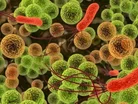[VIDEO] The Coming Crisis of Antibiotic Resistance

Ramanan Laxminarayan is a health economist and professor. He recently hosted a TEDMED discussion where he applied lessons learned from the energy crisis to the rising challenge of antibiotic drug resistance.
According to Laxminarayan, “It has been a long time since people died of untreatable bacterial infections and the prospect of returning to that world is worrying.”
Antibiotics have been used to treat deadly diseases throughout time, but they have also been used on a smaller scale for treating the flu and cold-like symptoms. Laxminarayan additionally noted that antibiotics have been used on a large scale sub-therapeutically, to increase the sizes of chickens and hogs faster.
Due to this massive use of antibiotics around the world, it has imposed such large selection pressure on bacteria that resistance is now a problem because “we’ve now selected the resistant bacteria.”
[READ MORE] Can this Newly Discovered Antibiotic Kill the Most Dangerous Superbugs?
“I really want you to appreciate the significance of this problem,” Laxminarayan stressed during his presentation. “This is serious.”
The problem of antibiotic resistance is a global issue that is affecting both rich and poor countries. There is something fundamental about antibiotics which make them different from other drugs.
“We don’t consider, and we including individuals, patients, hospitals, entire health systems, do not consider the cost they impose on others by the way antibiotics are used,” said Laxminarayan.
That’s similar to the problem of fuel and energy use as this use leads to local pollution and climate change.
Typically in the case of energy there are two ways to handle the issue. One is to make better use of the oil that we already have and that’s analogous to making better use of the existing antibiotics, the other option is the “drill, baby, drill” option which in the case of antibiotics is to find new antibiotics.
“These are not separate, because if we invest heavily in new oil wells, we reduce the incentives for conservation of oil and the same way that’s going to happen for antibiotics,” Laxminarayan said.
[READ MORE] TOP 10: Innovative Pharma Companies to Watch in 2015
The reverse is also going to happen where if we use our antibiotics appropriately, we don’t actually have to make the investments in new drug development.
If you think these two options are fully balanced, you might consider the dynamic of a cheetah and a gazelle.
“This is really a game that we’re playing. The game is really one of co-evolution,” Laxminarayan said.
In the scenario of the cheetah and the gazelle, cheetahs have evolved to run faster because if they didn’t they wouldn’t get any lunch, and gazelles have evolved to run faster because if they didn’t they would be lunch.
“This is the game we’re playing against bacteria,” Laxminarayan said, “except we’re not the cheetahs, we’re the gazelles.
According to Laxminarayan, this is not a game we can win by simply innovating, we have to slow the pace of co-evolution down.
“We need to completely rethink how we’re going to use measures to control biological organisms,” stated Laxminarayan.
Watch Laxminarayan’s discussion on this topic below and his ideas on how we can use lessons from energy to solve this global issue.
Follow us on Twitter (@HealthcareGlbl) and like us on Facebook!
- Vaccines, Dementia & Food: The Week's Top Healthcare StoriesMedical Devices & Pharma
- Stanford: A Shingles Vaccine Could Cut Dementia Risk by 20%Medical Devices & Pharma
- Alfa Laval Hopes New Center will Help Pharma InnovationSustainability
- What Does Eli Lilly’s US$3bn Dutch Pharma Investment Mean?Procurement & Supply Chain



